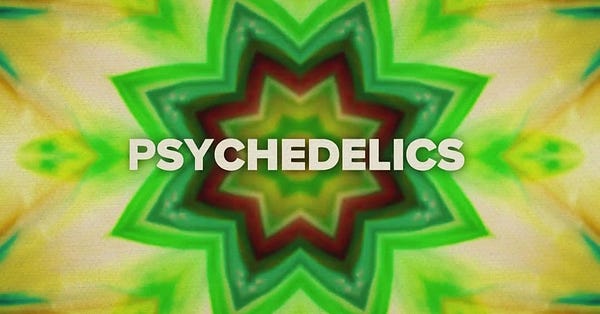Psychedelic Recap: Feb 15 - Feb 23, 2023
Utah Proposes Therapeutic Use of Magic Mushrooms; John Oliver on Psychedelics; The Integration of AI in Healthcare; And How Psilocybin Can Fix Your Brain.
Utah Proposes Pilot Program for Psilocybin Use in Therapy
Utah lawmakers are proposing a pilot program for medical and therapeutic use of psilocybin, the active ingredient in magic mushrooms.
This proposal aims to provide legal access to patients seeking treatment for their ailments, especially those related to mental health.
Currently, the substance is illegal under federal law, and therapists who guide patients through trips usually ask them to source magic mushrooms themselves out of fear of losing their licenses.
Utah's high suicide rates and shortage of mental health professionals highlight the need for legalizing psilocybin for therapeutic use.
Advocates in red states like Utah and Missouri seem to be taking the conservative approach here, asking that these substances be made legal for medical use or research first, similar to the path taken towards marijuana legalization.
The proposal aims to provide a solution to the challenges in accessing mental health services while complying with federal laws.
Last Week Tonight: On Psychedelic-Assisted Therapy
If you're curious about the remarkable potential of the nascent field that is psychedelic-assisted psychotherapy, then you don't want to miss this informative and entertaining video from Last Week Tonight with John Oliver. With his trademark wit, insight & humor, Oliver dives deep into the history, science, and controversies surrounding this emerging field of mental health treatment. Whether you're a skeptic or true believer, this video is sure to challenge your assumptions and expand your understanding. Watch it here or on YouTube!
Opinion: The Intersection of Psychedelics, AI & Decentralized Research
The intersection of psychedelics and AI is a relatively new and exciting area of experimentation that holds immense promise for advancing healthcare. At its core, this intersection is about leveraging the power of AI to better understand the effects of these substances on the brain, and then using this knowledge to develop more effective treatments for a wide range of mental health conditions.
Psychedelics have long been used by humans to explore altered states of consciousness, and in recent years, there has been growing interest in their potential therapeutic benefits. Researchers have found that psychedelics can help alleviate symptoms of depression, anxiety, PTSD, and other mental health disorders.
However, a lot is still unknown about the mechanisms behind the therapeutic potential of psychedelics. And this is where AI enters the picture…
By analyzing brain imaging data and other physiological markers, AI could help researchers better understand the effects of psychedelics on the brain. For example, AI algorithms might be trained to identify patterns in brain activity that correspond to particular subjective experiences, such as feelings of unity or ego dissolution. By mapping these patterns onto specific brain regions, researchers will be able to gain new insights into how psychedelics work and develop more targeted interventions.
Moreover, AI could be employed to optimize dosing protocols, predict treatment outcomes, and develop personalized healthcare programs. For instance, by analyzing large datasets of brain imaging inputs and treatment outcomes, AI could potentially identify which patients are likely to respond best to a given psychedelic treatment, and then dosage can be adjusted accordingly.
Additionally, implementing a decentralized research strategy could further assist AI in developing more effective psychedelic medicine to treat mental health conditions. By encouraging increased collaboration and open sharing of data, decentralized research could help researchers access a larger and more diverse pool of information, which can lead to more comprehensive insights and better treatment options.
How Can Decentralized Research Contribute to the Development of Effective Psychedelic Medicine?
Collaborative research – decentralized research can help bring together researchers from different backgrounds and fields to collaborate on psychedelic medicine research. This can facilitate the exchange of knowledge and ideas, leading to more effective and innovative treatments.
Open data sharing – decentralized research can enable open data sharing, making it easier for researchers to access and analyze large datasets from a wide range of sources. This can provide a more complete understanding of the mechanisms behind psychedelic therapies and help AI algorithms to better predict treatment outcomes.
Patient-centered approach – decentralized research can empower patients to participate in research and share their experiences with psychedelic therapies. This can provide valuable data that can help researchers better understand how these therapies work and how to optimize dosing protocols for different patient populations.
Increased diversity – decentralized research can help ensure a more diverse pool of participants, which is important for understanding how psychedelic therapies work in different populations. This can lead to more effective treatments that are tailored to the unique needs of each patient.
Overall, decentralized research has the potential to help AI develop more effective psychedelic medicine for mental health conditions by facilitating collaboration, open data sharing, and a patient-centered approach. It can also bring together a diverse range of perspectives and data sources, thus helping researchers gain a more comprehensive understanding of how psychedelic therapies work, leading to more effective treatments and better outcomes for patients.
By shedding new light on the mechanisms behind psychedelic therapies, and integrating the strategies listed above, AI can help scientists & medical professionals develop more effective and targeted treatments for numerous mental health conditions, thereby improving the lives of millions of people around the world.
Psychedelics May Improve Mental Health Through Neuron Growth & Repair
Studies suggest that psychedelics, such as LSD and psilocybin, may enhance nerve cell growth in the brain, which can lead to an improvement in mental health. Research has discovered that these drugs stimulate the growth of new neurons and support their integration into existing neural networks.
Chronic stress can damage neurons in the cortex, leading to mental health conditions such as depression and PTSD. Psychedelics can promote the growth of nerve cell branches, which may provide therapeutic benefits. This is achieved by activating the 5-HT2A receptor, a protein that receives signals and gives instructions to cells. Psychedelics have been found to easily pass through cell membranes – resulting in neuron growth – while chemicals such as serotonin cannot. However, once serotonin gains access to the neuron's interior, it, too, can induce neuron growth. By understanding the cellular mechanisms behind psychedelics, we can create safer and more effective treatments for mental health disorders.
Learn More at sciencenews.org
Psychedelic Resources
If you’re looking to discover more about the therapeutic nature, and grand potential, of psychedelics, we’ve got you covered. Below, we’ve collected five pieces of relevant source material, which we hope you’ll find useful or interesting:
Carhart-Harris, R. L., & Goodwin, G. M. (2017). The therapeutic potential of psychedelic drugs: past, present, and future. Neuropsychopharmacology, 42(11), 2105–2113. nature.com
Carhart-Harris, R. L., & Friston, K. J. (2019). REBUS and the anarchic brain: Toward a unified model of the brain action of psychedelics. Pharmacological Reviews, 71(3), 316-344. pharmrev.aspetjournals.org
Kyzar, E. J., Nichols, C. D., Gainetdinov, R. R., & Nichols, D. E. (2017). Psychedelic drugs in biomedicine. Trends in Pharmacological Sciences, 38(11), 992-1005. cell.com
Lebedev, A. V., Kaelen, M., Lövdén, M., Nilsson, J., Feilding, A., Nutt, D. J., & Carhart-Harris, R. L. (2019). LSD-induced entropic brain activity predicts subsequent personality change. Human Brain Mapping, 40(9), 2970-2981. onlinelibrary.wiley.com
Nutt, D. J., King, L. A., & Nichols, D. E. (2013). Effects of Schedule I drug laws on neuroscience research and treatment innovation. Nature Reviews Neuroscience, 14(8), 577-585. nature.com
From Twitter













